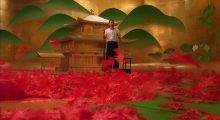Paul Schrader
-
Cannes 2024: Oh, Canada and The Shrouds

For decades, Paul Schrader’s taste in cinema has been widely known, particularly the Bressonian proclivities he’s repeatedly worked over—and, especially since becoming a Facebook poster, he’s provided an open invitation to make his problems ours as well. Watching Oh, Canada knowing of his recent health scares, my guess was that the topical draw of Russell Banks’s source novel Foregone was death; indeed, after several hospitalizations for long COVID, Schrader told himself, “If I’m going to make a film about death, I’d better hurry up.” Thus Oh, Canada, which reteams Schrader with his American Gigolo star Richard Gere (the writer-director jokes […]
by Vadim Rizov on May 24, 2024 -
Three Bullets in the Gun: Paul Schrader on Master Gardener

If a screenplay packs a big reveal, in which everything you think you know about the lead character is immediately upended, does the film live and die by its twist? Or is it even considered a twist when said reveal arrives 20 minutes into a 112-minute feature? Paul Schrader’s latest, the intentionally provocative but surprisingly gentle (for a Paul Schrader movie) Master Gardener, is not a film that lives or dies by what you know going into it, but, as is the case with most of his offerings, I’d advise you to not look up more than your local showtimes. […]
by Erik Luers on May 23, 2023 -
Trailer Watch: Paul Schrader’s Master Gardener

After premiering at Venice and screening at the NYFF last year, Paul Schrader’s Master Gardener finally receives a release date. The writer-director’s latest, which completes his late-career trilogy after The Card Counter (2021) and First Reformed (2017), will hit theaters via Magnolia Pictures on May 19. The film’s official synopsis reads: Master Gardener follows Narvel Roth (Joel Edgerton), the meticulous horticulturist of Gracewood Gardens. He is as much devoted to tending the grounds of this beautiful and historic estate, to pandering to his employer, the wealthy dowager Mrs. Haverhill (Sigourney Weaver). When Mrs. Haverhill demands that he take on her […]
by Filmmaker Staff on Mar 28, 2023 -
“If Bresson Had Digital Cinematography, What Might He Do?”: DP Alexander Dynan on the Portraits, Inserts and VR Nightmares of The Card Counter

With The Card Counter, Paul Schrader has written another “man in[to] a room”: William Tell (Oscar Isaac), an ex-torturer turned professional poker player, lives hotel to hotel, making each unit his own by wrapping their furniture in his own sterile, white sheets—“essentially bleached muslin,” the film’s DP Alexander Dynan says. A little light went a long way when capturing these whitened rooms on the light-sensitive, medium format Alexa LF camera. Sometimes Dynan lit Isaac journaling with nothing but a bulb wrapped in diffusion—something he could not justify using on First Reformed, as pastor Toller (Ethan Hawke) did not diary near a fabric-covered lamp. […]
by A.E. Hunt on Sep 10, 2021 -
Venice Film Festival Critic’s Notebook 2021: Dune and The Card Counter (An Oscar Isaac Double Feature)

Two of this year’s high-profile Venice premieres, Dune and The Card Counter, are auteurist works recognizable by multiple of their makers’ signatures. Both star Oscar Isaac and arrive as pandemic-affected productions that (try to) bear no trace of that circumstance. Dune finished principal photography before COVID-19’s global spread, while The Card Counter was 3/4 of the way through production when it hit; Isaac completed its rescheduled remainder before flying to Hungary for Dune reshoots. Optimistically subtitled Part I (this covers the first of the novel’s three volumes)*, Dune arrives with the unplanned burden of attempting to make the case for the Big Screen Experience—Denis Villeneuve’s been very […]
by Vadim Rizov on Sep 3, 2021 -
Trailer Watch: Paul Schrader’s The Card Counter

The first trailer for The Card Counter, Paul Schrader’s keenly anticipated follow-up to First Reformed, has arrived. The premise is straightforward: sentenced to ten years in prison, fall guy Oscar Isaac learns how to count cards. The tone here is intriguingly all over the place, including Isaac’ flirtatious casino floor meeting with dealer Tiffany Haddish, promises of cold-blooded revenge and at least one shot directly quoting, per Schrader’s usual reference point, Pickpocket. (It’s the hands reaching towards each other through a prison visiting room’s glass pane.) The Card Counter premieres at this year’s Venice Film Festival before entering release on September 10 from […]
by Filmmaker Staff on Jul 27, 2021 -
Buddies, Bound and First Reformed: Jim Hemphill’s Weekend Blu-ray Recommendations

One year before the release of Parting Glances and four before Longtime Companion, Arthur Bressan Jr. wrote, produced, directed and edited Buddies (1985), one of the first narrative feature films to put AIDS front and center as a subject. It might be the first, but the television movie An Early Frost aired at around the same time, and in any case, I’ve learned not to make claims for anything being the absolute first when it comes to film history since there are inevitably obscurities that elude even a guy like me who spends every waking hour watching and thinking about […]
by Jim Hemphill on Aug 24, 2018 -
Committed to Paper: Writer/Director Paul Schrader on First Reformed

With Paul Schrader’s First Reformed, which has topped many critics’ lists so far this year, on iTunes today, we’re unlocking from our paywall Darren Hughes’s interview with the writer/director from our Summer print edition. When discussing his latest film, First Reformed, Paul Schrader regularly recounts a conversation he had over dinner with the Polish filmmaker Pawel Pawlikowski. Schrader, who famously discovered cinema as a college student after coming of age in a strict Calvinist home, has very intentionally spent his career exploring darker, more transgressive aspects of the spiritual condition. He was intrigued, however, by Ida, Pawlikowksi’s quiet, black-and-white study […]
by Darren Hughes on Jul 31, 2018 -
Schrader’s Mishima, Cristian Mungiu on Criterion and Dear White People: Jim Hemphill’s Weekend Viewing Recommendations

In a nice bit of cinematic serendipity, Paul Schrader’s singular 1985 film Mishima: A Life in Four Chapters arrives on Blu-ray from Criterion at the same moment that his latest movie, First Reformed, is enjoying a deservedly successful art house run. Mishima remains perhaps Schrader’s most original and idiosyncratic film, which is really saying something; a meditation on the life and writings of Japanese author Yukio Mishima, it’s neither a conventional bio-pic nor a straightforward literary adaptation, though it combines elements of both forms. Schrader, writing in collaboration with his brother Leonard (Kiss of the Spider Woman) and sister-in-law Chieko, […]
by Jim Hemphill on May 25, 2018 -
Five Questions for First Reformed Director Paul Schrader

Paul Schrader returns to form with a deeply introspective film, First Reformed, which, following screenings in Venice, Telluride and Toronto, screens tonight at the New York Film Festival, where it was a late addition to the program. The writer of films including Taxi Driver and Raging Bull and director of films including American Gigolo and Affliction delivers a new work that both contains echoes of his previous pictures depicting “God’s Lonely Men” while also being quite unlike anything he’s ever done. (Plus, argues Vadim Rizov, something of a treatise on the role of Slow Cinema today.) Ethan Hawke stars as a former […]
by Ariston Anderson on Oct 6, 2017










